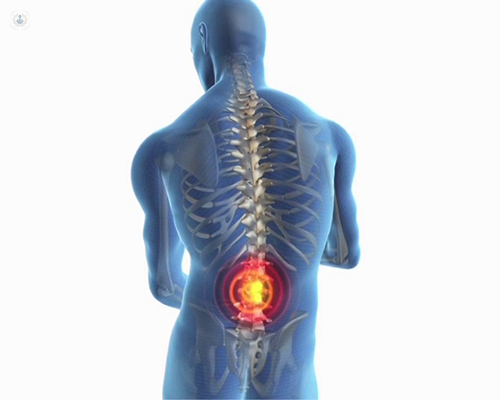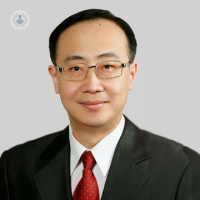Laser disc surgery: what is it and is it safe?
Written by:Top Doctors recently spoke to highly esteemed consultant neurosurgeon and spinal surgeon, Mr John Yeh, to quiz him on what exactly laser disc surgery entails, the main risks involved, and what the main difference is between laser disc surgery and traditional surgery.

What is laser disc surgery?
It is a needle-based type of surgery that is performed as a day-case procedure. It is usually done under sedation, and can also be done under general anaesthetics. During the procedure, a needle is placed into the diseased disc very carefully and safely.
A fine laser fibre is then passed down the needle and into the disc. Then, the laser vaporises a small volume of this material, and reduces the pressure inside the disc.
Why might people need laser disc surgery?
Laser disc surgery is not suitable for all slipped hernia or slipped prolapse discs. However, it is an extremely reasonable alternative to traditional disc surgery for the majority of the most common of slipped hernia disc injuries or prolapsed discs.
What is the difference between laser disc surgery and traditional disc surgery?
Laser disc surgery is a needle-based surgical intervention. The risks of this surgery, are, therefore, much lower than traditional disc surgery, with a much shorter recovery time. Laser disc surgery also avoids causing scar tissue.
How effective is laser disc surgery?
Laser disc surgery is approved by the National Institute for Healthcare Excellence. Studies have shown that up to 75 per cent of patients find laser disc surgery to be extremely effective and helpful.
What are the main risks of laser disc surgery?
There is, of course, like any surgery, a very small risk of infection. However, this can, in almost all cases, be avoided when laser disc surgery is performed. The tip of the needle can sometimes bruise the tissues, which thankfully resolves in a few days.
What is recovery from laser disc surgery like? Is it painful and how long is the recovery period?
Very occasionally, the disc tissue may react with the laser and can become inflamed and painful, which takes a few weeks to settle. Overall, though, recovery time is quick, with little to no pain experienced in most cases.
Mr John Yeh is a highly accomplished London and Buckhurst Hill-based consultant neurosurgeon and spinal surgeon. Check out his Top Doctors profile today to book a consultation with him.


